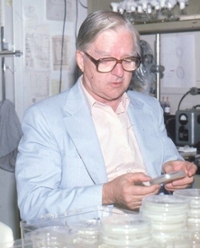
Edward E. Butler
Professor of Plant Pathology, Emeritus
Dr. Edward E. Butler, Professor Emeritus of Plant Pathology at the University of California, Davis, passed away on September 11, 2015. Ed Butler was born on December 8, 1919, in Wilmington, DE. He graduated from Seaford High School (Seaford, DE) in 1938 and, upon graduation, enrolled in the University of Delaware, where he earned a
B.S. degree in Agriculture in 1943. Upon graduation he went directly into the U.S. Army, achieving the rank of Captain in the Artillery during his service in World War II. Following his discharge from the Army in 1946, he entered graduate school at Michigan State University, where he earned his M.S. degree in Botany and Plant Pathology. He then enrolled in the graduate program at the University of Minnesota, where he earned his PhD degree in Plant Pathology in 1954. He studied under two giants during his graduate work at Michigan and Minnesota – Dr. Constantine Alexopoulos and Dr. E. C. Stakman, respectively. In 1955, Ed joined the faculty at UC Davis as a junior plant pathologist. In 1957, he was promoted to assistant plant pathologist, followed by promotion to associate professor in 1962 and full professor in 1969.
Initially, Ed was responsible for developing a research program in the area of postharvest diseases of fresh fruits and vegetables. However, following his assignment to teach advanced mycology, his research evolved to focus more on the ecology, biology, cytology, and sexuality of fungi. Ed’s research was in several broad areas within the discipline of mycology: mycoparasitism, the biology of Rhizoctoniasolani, sexuality and Geotrichumcandidum, and preservation of fungal specimens. He is perhaps best known for his long-term and multifaceted research on Rhizoctoniasolani. His elucidation of the structure of the dolipore septum with his graduate student, the late Prof. Charles Bracker, stands as a classic. Likewise, his research into anastomosis groups and sexuality in R. solani laid the foundation for our understanding of biological and pathological groupings within R. solani.
Ed’s primary teaching responsibility was advanced mycology – focusing on plant pathogenic fungi. He taught this course from the 1950s until his retirement in 1990. He also supervised nine Ph.D. and two M.S. candidates and served on the research committees of 16 other Ph.D. candidates. Ed served for many years as an academic advisor for graduate students, and as a member of the department’s graduate affairs and curriculum committees.
Ed was a member of the American Phytopathological Society, the Mycological Society of America, the Botanical Society of America, and the British Mycological Society. In 1981 he was the second recipient of the prestigious W. H. Weston award for teaching excellence in mycology, from the Mycological Society of America, the highest recognition possible in the area. When asked to describe what qualities characterized his teaching, he first acknowledged an undefinable human element that students respected and responded to. But then he explained that it was important to establish a relationship that helped students to enjoy the subject matter and search beyond what was required in the course. He sought to foster a relationship that provoked students but also instilled trust and let the students know that he cared for them. He also tried to relate mycology to human affairs, and he assigned high value to the laboratory as an important learning environment. In 1991, Ed was named a Fellow of the American Association for the Advancement of Science. He was active in APS, serving as the local arrangements Chairman for the 1966 and 1975 Pacific division meetings in Davis. He served for many years on the APS Mycology Committee, the Monographs and Reviews Committee, and the Archives Committee. He was UCD’s quarantine representative to the California Department of Food and Agriculture. He also served for many years on the governing board of the UCD chapter of the honor society of Phi Kappa Phi, and was acknowledged by this organization in 1990 for his contributions to excellence in education.
Ed Butler’s influence extended from the graduate students in his own department, to those in other departments and schools, to faculty colleagues in his department, to his professional societies, to virtually everyone he came into contact with. Following his retirement, Ed continued to remain active in the department for many years in a small office/laboratory where many graduate students sought his advice and opinions on mycological issues. His door was always open to them. Ed is survived by his wife of 68 years, Mildred; his brother Edward Harry; his sons David (JoAnne) and Stephen (Gail); his daughter Susan Epling (David), and sons Thomas (Cherie) and James (Stephanie), as well as numerous nieces, nephews, and grandchildren. A celebration of his life was held in Davis on January 9, 2016.
Richard M. Bostock
James D. MacDonald
